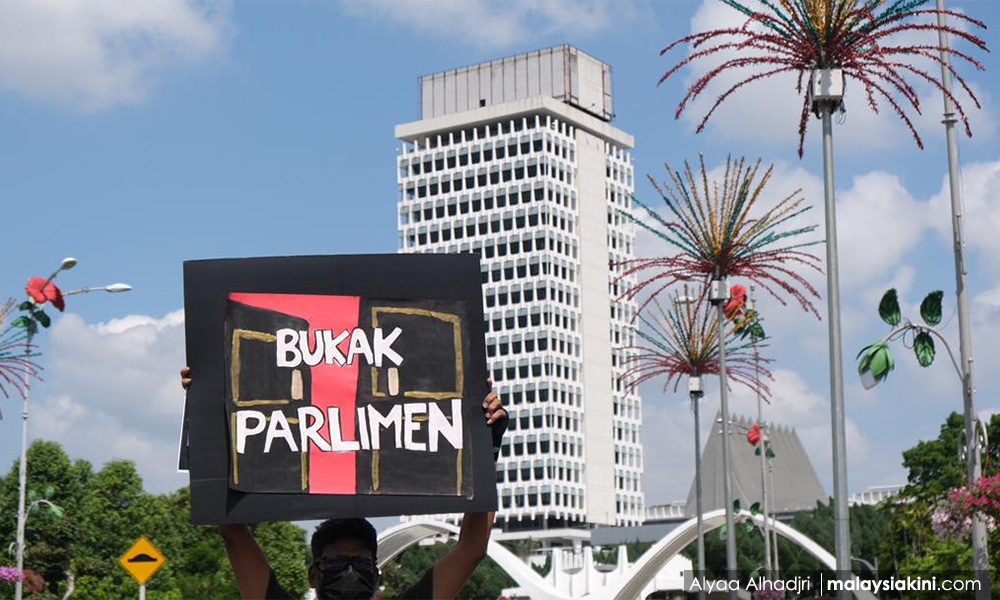Behind every past emergency declarations, including the current state of emergency, there have been "ulterior motives" to further the aims of the government, said economist Prof Jomo Kwame Sundaram.
Looking back at five past emergencies in Malaysia's history, Jomo (above) said vested interests had been a primary factor behind their declarations, above any reasons stated by the government.
The first emergency declaration in 1948 against the communist insurgency, Jomo said, was declared by the British to retain then Malaya as its prime colony.
Similarly, he said the British also had an interest to protect its territories when an emergency was declared in 1964 during the confrontation with Indonesia.
Two years later, Jomo said the emergency declared in Sarawak was to remove Stephen Kalong Ningkan as then chief minister.
In 1969, he said that a state of emergency post-May 13 racial riots was declared as, among other reasons, the then coalition failed to secure a majority in Parliament but "through their own ways" gained power.
Lastly, he cited the 1978 emergency in Kelantan, arguing that it was done for BN to reclaim the state government at the time.
"So, what is clear, we can see that in all the emergency declarations, there is an ulterior motive.
"It was a necessary move, but there are other interests," he said during a press conference hosted by the 'Tolak Darurat' committee in Kuala Lumpur today.
Aside from Jomo, two other economists, Nungsari Ahmad Radhi and Muhammed Abdul Khalid, also participated in the discussion on the emergency's negative impacts on the economy, hosted by Shah Alam MP Khalid Samad as Tolak Darurat chairperson.
Evaluating the Perikatan Nasional government's Covid-19 prevention measures, including the various movement control orders, Jomo said they had damaged the economy more than the direct impact of the pandemic.
"If we see what is happening now, we find that it is undeniable the Covid-19 pandemic started early last year.
"We find that the direct impact (of the pandemic) on the economy is not as great. But the indirect impact from government's measures - that was what negatively impacted the economy," he said.
Aside from the six states of emergencies stated by Jomo, there were several other targeted declarations to manage extreme haze in 1997, 2005 and 2013, as well as in the postponement of the scheduled Batu Sapi by-election last year.
Meanwhile, Nungsari said the government, by declaring an emergency, has indirectly denied its ability to function as normal, directly affecting the confidence levels of investors.
He said this was despite investors' confidence being a key aspect to boost economic growth.
"By declaring an emergency, we are saying that the normal way of doing things - enforcing the laws and others - are inadequate, and therefore we declare an emergency.
"Ironically, the declaration itself has drastically reduced investors' confidence levels," said the former Khazanah Research Institute chairperson.
As such, Nungsari said he supports the call for the country to restore democracy through the lifting of the state of emergency and reconvening of Parliament.
Prime Minister Muhyiddin Yassin had advised the Yang di-Pertuan Agong to suspend Parliament and declare a state of emergency from Jan 11 to Aug 1 as a Covid-19 prevention measure.
Critics have claimed the move was done to secure Perikatan Nasional's hold on Putrajaya, amid changing allegiances among MPs and questions raised over its legitimacy.
In February, the Yang di-Pertuan Agong had decreed that Parliament could reconvene during the emergency, at a date deemed suitable on the advice of the prime minister. - Mkini





No comments:
Post a Comment
Note: Only a member of this blog may post a comment.